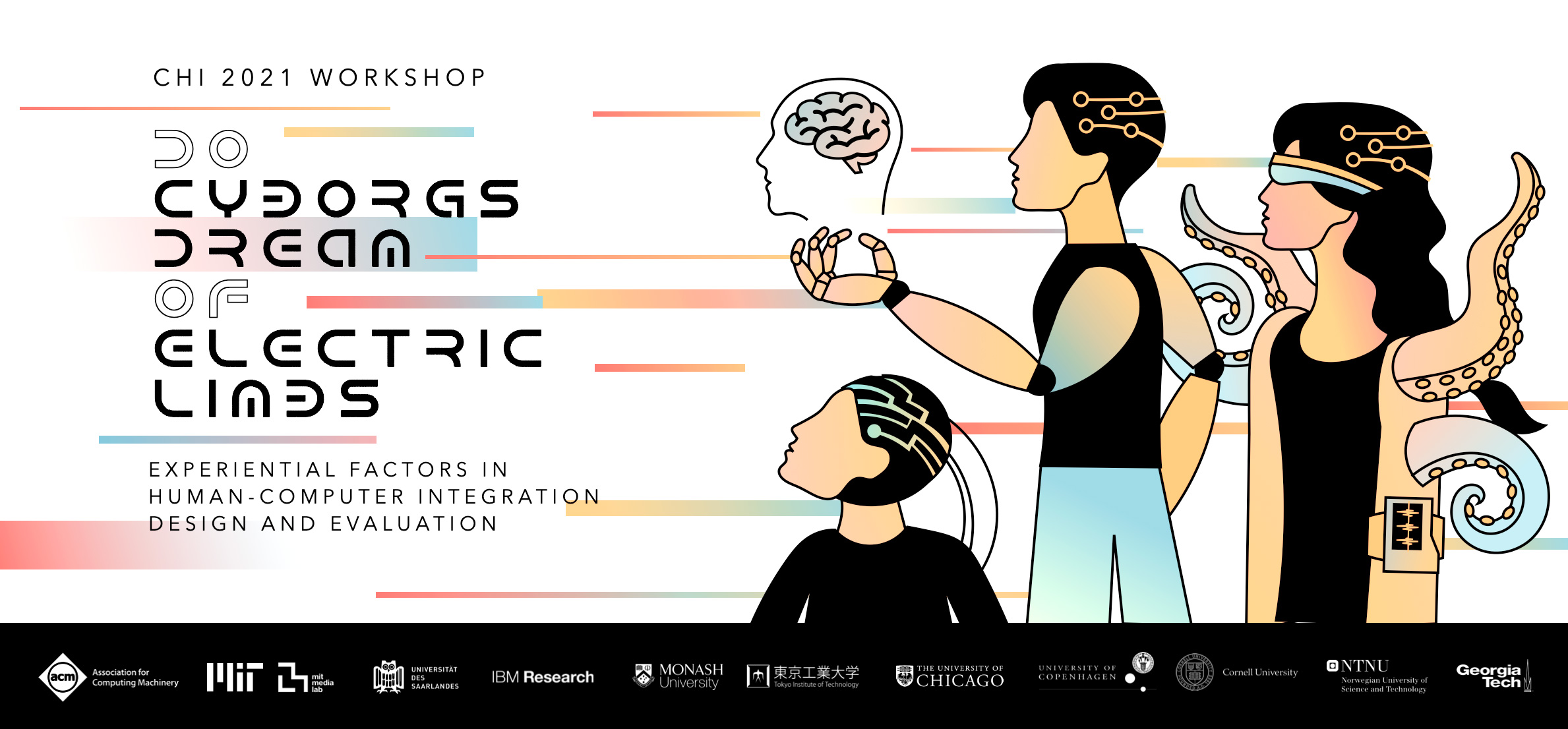
Do Cyborgs Dream of Electric Limbs?
A CHI 2021 Workshop on Experiential Factors in Human-Computer Integration Design and EvaluationWhile many systems have successfully demonstrated functional integration of humans and technology, little attention has been paid to how technologies might experientially integrate to feel as part of humans. Having a strong sense of self has been shown to increase body-protective behavior, intuitive functioning and body co-ordination – while a diminished sense of self has been linked to various disorders of consciousness like schizophrenia, somatoparaphrenia and depersonalization. Experiential integration would thus not just allow artificial modifications to be felt like a natural part of the body but also provide positive functional and psychological benefits.
Our aim is to shed light on the importance of experiential integration and provide researchers with a scientifically driven foundation for future designs and investigations. The workshop will consist of hands-on experiments with novel body-illusions, discussions on experiential integration, and instructor-guided sessions on psychological concepts related to the design and evaluation of experiential integration.
What is Experiential Integration?
In spite of new opportunities for increasing human performance, accessibility, and experience overall, we see limitations in current research on Human-Computer Integration. First, research on Human-Computer Integration is mostly a technical enterprise in that it is primarily concerned with the ‘physical form-factor’ and ‘performance measures’ of integration. However, for humans to successfully integrate with computers it is not sufficient to only think about ‘physical integration’. An exoskeleton might for instance be able to move a user’s fingers to make their body play the piano effortlessly while still not providing them with a sensation that those actions were “done by me”, or a prosthetic limb might help the user to walk effortlessly while not providing the user with a sensation that “the prosthesis is part of me” . If we are to experience the computer as “part of us”, we must therefore also consider ‘experiential integration’, that is, how a technology might be experienced as a natural part of the user’s body.
What is Experiential Integration?
In spite of new opportunities for increasing human performance, accessibility, and experience overall, we see limitations in current research on Human-Computer Integration. First, research on Human-Computer Integration is mostly a technical enterprise in that it is primarily concerned with the ‘physical form-factor’ and ‘performance measures’ of integration. However, for humans to successfully integrate with computers it is not sufficient to only think about ‘physical integration’. An exoskeleton might for instance be able to move a user’s fingers to make their body play the piano effortlessly while still not providing them with a sensation that those actions were “done by me”, or a prosthetic limb might help the user to walk effortlessly while not providing the user with a sensation that “the prosthesis is part of me” . If we are to experience the computer as “part of us”, we must therefore also consider ‘experiential integration’, that is, how a technology might be experienced as a natural part of the user’s body.

Feeling that a computer is part of you can have functional implications on a user, such as protective behaviors, availability expectations, and help avoiding negative psychological effects such as depersonalization. Credit: Fluid Interfaces
Workshop Goals
The workshop’s primary goals are:
- to serve as an enduring community and discussion platform for researchers whose work focuses on the technologies that impact “self-hood”
- articulate the first-person aspects of self-integrated systems in forms of experience and examples
- understand forthcoming issues of designing and evaluating self-integrated systems
- discuss the ethical implications of integration with technology
- consider experiential boundaries, fragility of self-concept, disorders in which pre-reflective awareness and derealization are implicated
- extend the collaborative research and community engagement through building new research programs.
Topics
Major topics discussed in the workshops include
- “Sense of Body-ownership” and a “Sense of Agency” over a body-integrated computer
- Neurocognitive and Phenomenological sciences of HCI
- Theory of experiential integration
- Design and Implementation for experiential integration technologies
- Evaluation methods for experiential integration
CONFERENCE:
ACM CHI 2021, Yokohama, Japan.
TIME: Sunday May 15, 2021 | 17:00-21:00 EST
AUTHORS:
Valdemar M. Danry, Pat Pataranutaporn, Sang W. Leigh, Pattie Maes
WEBSITE:
http://cyborgdreams.media.mit.edu/.
KEYWORDS: Human-Machine Integration, Experiential Integration, Phenomenology, Cognitive Science, Sense of Ownership, Sense of Agency.
SKILL: Phenomenology, Cognitive Science, Body Illusions, HCI Literature Review
PUBLICATION: Danry, V., Pataranutaporn, P., Horowitz, AH., Strohmeier, P., Andres, J., Patibanda, R., Li, Z., Semertzidis, N., Nakamura, T., Nishida, J., Lopes, P., León, F., StevensonWon, A., Svanæs, D., Mueller, F., Maes, P., Leigh, S. (2021, Under Review). Do Cyborgs dream of Electric Limbs? Experiential Factors in Human-Computer Integration Design and Evaluation. In Proceedings of the 2021 CHI Conference Workshops.
ROLE:
Leading organizer
ACM CHI 2021, Yokohama, Japan.
TIME: Sunday May 15, 2021 | 17:00-21:00 EST
AUTHORS:
Valdemar M. Danry, Pat Pataranutaporn, Sang W. Leigh, Pattie Maes
WEBSITE:
http://cyborgdreams.media.mit.edu/.
KEYWORDS: Human-Machine Integration, Experiential Integration, Phenomenology, Cognitive Science, Sense of Ownership, Sense of Agency.
SKILL: Phenomenology, Cognitive Science, Body Illusions, HCI Literature Review
PUBLICATION: Danry, V., Pataranutaporn, P., Horowitz, AH., Strohmeier, P., Andres, J., Patibanda, R., Li, Z., Semertzidis, N., Nakamura, T., Nishida, J., Lopes, P., León, F., StevensonWon, A., Svanæs, D., Mueller, F., Maes, P., Leigh, S. (2021, Under Review). Do Cyborgs dream of Electric Limbs? Experiential Factors in Human-Computer Integration Design and Evaluation. In Proceedings of the 2021 CHI Conference Workshops.
ROLE:
Leading organizer
